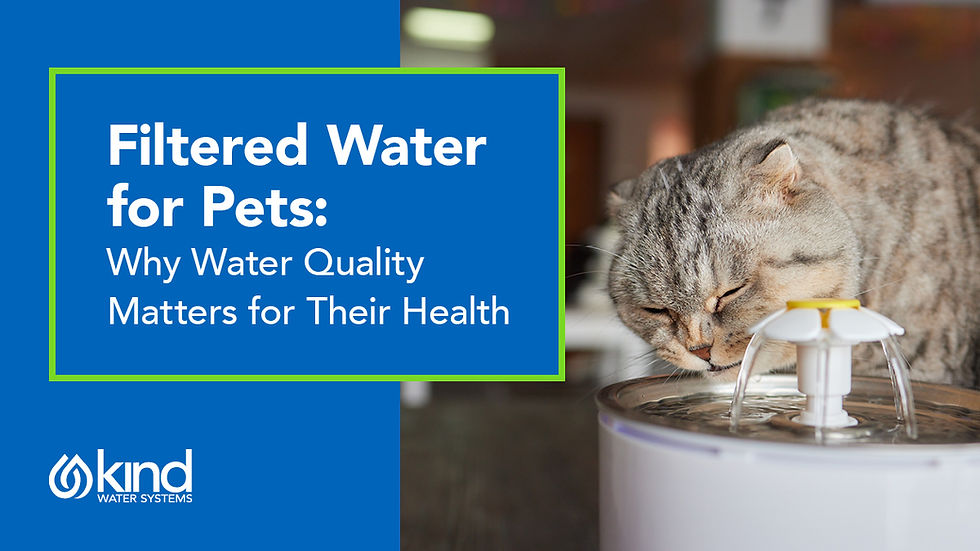Is Filtered Water a Healthier Choice for Your Pets? Exploring the Unknown
- forgachplumbing
- Jun 17, 2025
- 4 min read

When it comes to our pets, every owner wants to give the best care possible. One crucial aspect often neglected is the water they drink. With more people focusing on clean drinking water for themselves, many pet owners are asking: is filtered water a better choice for pets? This article explores the benefits and considerations of filtered water for pets, helping you make informed decisions for your furry companions.
The Importance of Hydration
Hydration is essential for the health and well-being of pets, just like it is for humans. Animals require a constant supply of water to perform vital functions, regulate body temperature, and maintain overall health.
Pets can become dehydrated easily, especially during hot weather or after vigorous activity. For example, a dog weighing 20 pounds may need around 1 cup of water for every 10 pounds of body weight each day. Providing your pet with clean, fresh water enhances digestion, circulation, and organ function.
Keep in mind: pets, especially dogs and cats, can be picky about the taste of their water. Offering filtered water may encourage them to drink more, ultimately improving their hydration levels.
Understanding Filtered Water
Filtered water is water that has been purified using various methods to remove impurities, contaminants, and potentially harmful substances. Common filtration techniques include activated carbon filters, reverse osmosis systems, and ultraviolet light purifiers.
These methods effectively reduce chlorine, heavy metals, and other unwanted elements in water. For pet owners, knowing the benefits of filtered water is vital when considering their pets' hydration needs.
Benefits of Filtered Water for Pets
Reduces Contaminants
One main benefit of filtered water is the significant reduction of harmful contaminants. Research shows that tap water can contain traces of chlorine, heavy metals, and other impurities that may affect your pet's health over time. For instance, regular exposure to lead, even in small amounts, can be harmful to pets, leading to long-term health issues.
When you offer filtered water, you reduce your pet's exposure to these dangerous substances, potentially resulting in a healthier and happier life.
Enhances Taste and Smell
Pets are often sensitive to what they drink. The chlorine and other impurities in tap water can create an unpleasant taste that might discourage your pet from drinking enough. According to surveys, up to 60% of pet owners report that their pets prefer filtered or bottled water over tap water.
Filtered water can improve the taste and smell, encouraging them to drink more and better hydrate.
Promotes Better Digestive Health
Proper hydration is vital for digestion. For example, a hydrated dog may have a more efficient digestive system, leading to less constipation and better nutrient absorption. Filtered water can help maintain optimal hydration levels, promoting healthier digestion.
Potential Downsides of Filtered Water
Cost and Maintenance
While filtered water has many benefits, it’s essential to consider costs. Purchasing a filtration system can be an investment, and ongoing maintenance—such as replacing filters—is necessary. Some pet owners may hesitate due to these added costs, especially if they are on a tight budget.
Not All Filters Are Created Equal
It is important to remember that not all filtration systems remove the same impurities. Some might be effective against chlorine but not against heavy metals. Research and select a filtration system that meets your specific needs to ensure your pet benefits from high-quality water.
Changes in Routine
If your pet is used to drinking tap water, switching to filtered water may take some time. Pets are creatures of habit, and it could take a while for them to adjust to the new taste and smell of filtered water.
Practical Tips for Using Filtered Water for Pets
Invest in a Quality Filtration System
Before buying a filtration system, research the options available. Look for systems that efficiently remove the contaminants that worry you most. User reviews and expert recommendations can guide you to the best choice for your pet’s unique needs.
Gradual Transition
When switching from tap water to filtered water, ease the transition. Start by mixing a small amount of filtered water with tap water, gradually increasing the filtered water content while decreasing tap water access. This way, your pet can adapt to the new taste without stress.
Regular Maintenance
To ensure optimal performance of your filtration system, regular maintenance is key. Check the status of your filters frequently and replace them as recommended by the manufacturer. This habit ensures your pets receive the cleanest water possible.
Multiple Water Sources
Encourage your pets to drink more by offering filtered water in different locations around your home. This strategy makes fresh water accessible to them wherever they are, promoting a healthier hydration routine.
Final Thoughts
Filtered water can provide numerous advantages for your pets, from reducing harmful contaminants to enhancing taste and encouraging better hydration. While there are considerations, many pet owners find the overall benefits outweigh any drawbacks.
By investing in a reliable filtration system, allowing for a gradual transition, and keeping up with regular maintenance, you can give your pets the cleanest, healthiest water possible. Monitoring your pet's behavior will help guide you in making the most informed decisions for their health and happiness.




Comments